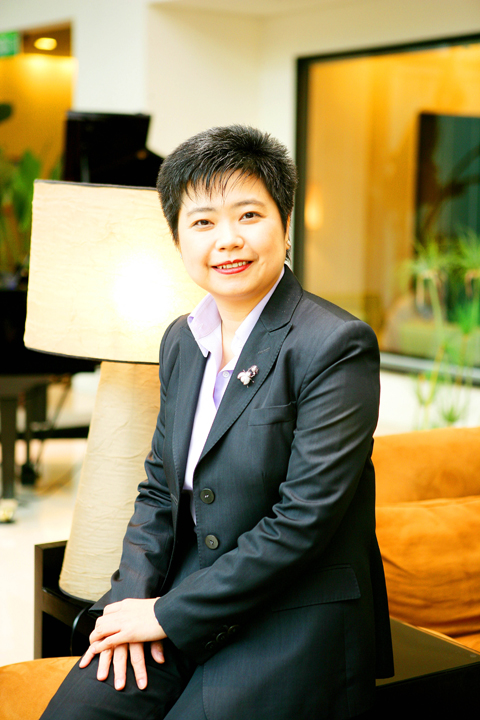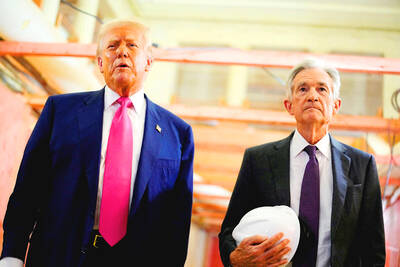Taipei Times (TT): What incentive do you think the India market offers to attract potential Taiwanese investments?
Helen Hui (許穗華): If you look at the world’s IT products, most are dominated by Taiwanese players. And then if you look at India’s niche, it’s also IT, such as software, which is a very strong industry in India. From that perspective, Taiwanese businesses have been very smart and pragmatic in terms of how they go after businesses. They go wherever their clients go. For example, Nokia are a big customer of Hon Hai Precision Industry Co (鴻海精密). So, where Nokia opens an operation, Hon Hai will follow. Nokia has a huge operation here in Chennai of which all Nokia suppliers are a part.
Taiwanese companies get close to their customers for a very practical reason: logistics. It’s much easier, from a logistics point of view. When they make the goods, they just transport them two blocks rather than arranging for shipments that add to the cost.

PHOTO: COURTESY OF STANDARD CHARTERED
From that angle, it makes a lot of sense for Taiwanese companies to consider investments in India as their clients have. And India has lots of IT talent and a steady flow of human capital — important elements for a manufacturing hub.
TT: From your observation, as one of the sponsors of the trade show TAITRONICS India in the past two years, are many Taiwanese businesses ready to tap into the India market?
Hui: Some are more ambitious than others, although a lot of the businesses are still in the assessment stage. And some are more ready than others — for example, Hon Hai or airline companies — if their clients are here. Some smaller companies are still looking at the big corporates as a part of their supply chain.
Toward the mid and the end of the supply chain, Taiwanese companies are dominating. But do they need to be here in a big way? It depends on their business value. Taiwanese businesspeople are very smart and go wherever they make money. It’s not in their blood to go places where they don’t make money [laughs]. And if they come up with a successful business model in India, the consumption power is also big.
Don’t underestimate the spending power here. China will of course always be a preferred location for Taiwanese. But nevertheless, do they want to put everything into one location when they can also tap into another big market like India, which is also known for its IT sector.
Some of the major financial institutions have moved their processing hubs into India because of the country’s IT intelligence and human capital. In our bank’s case, our [Chennai-based] Scope International employs more than 10,000 local people here to process 24 hours a day, seven days a week for the 72 country markets we operate globally.
TT: Now that some Taiwanese business has geared up to tap into the market here, is your bank interested in following your clients to cater to their needs for financial services?
Hui: Standard Chartered Bank bought Grindlays Bank from ANZ Bank back in 2000, which made us the largest foreign bank in India with 90 branches. So, we are very well positioned in India regardless of where our Taiwanese or local clients are.
From a presence and product point of view, we’re already big in the Indian market, one of our group’s top five markets.
If Taiwanese businesses start to make big investments in India, we’re well positioned to help them. What makes the whole picture complete is to add the language and cultural capabilities. If I can move a couple of Taiwanese bankers to come and be based in India to service the Taiwanese, I think we can then easily capture Taiwanese businesses in India.
TT: Will you set up a Taiwan desk similar the one you set up in Vietnam last month?
Hui: We talked about it [setting up a Taiwan desk in India] for the last 12 months. This is the second time I have come to Chennai to look at opportunities. We’re ready to put people here. And I’d like to get things going by the end of this year or the beginning of next year.
We’ll be adding two or whatever number of [Mandarin-speaking] bankers to leverage on the platform or products of our India businesses since the bank, as a global player, already has a huge infrastructure here.
TT: What financial services do you foresee Taiwanese businesses requiring if they decide to come to India?
Hui: In terms of products, we can do everything. Whatever we’re offering Indian clients, we can offer to Taiwanese clients. It depends on what the company needs from us, whether it’s working capital, refinancing, trade finances, mergers and acquisitions or corporate financing.
TT: How well is the Taiwan Desk in Vietnam doing?
Hui: Unlike our rivals, we’re not just hiring Vietnamese Mandarin-speakers. We’re sending people from Taiwan, who understand the clients’ culture. The feedback from our Taiwanese clients has been good although it’s too early to say whether we have turned a profit from the investment.

IN THE AIR: While most companies said they were committed to North American operations, some added that production and costs would depend on the outcome of a US trade probe Leading local contract electronics makers Wistron Corp (緯創), Quanta Computer Inc (廣達), Inventec Corp (英業達) and Compal Electronics Inc (仁寶) are to maintain their North American expansion plans, despite Washington’s 20 percent tariff on Taiwanese goods. Wistron said it has long maintained a presence in the US, while distributing production across Taiwan, North America, Southeast Asia and Europe. The company is in talks with customers to align capacity with their site preferences, a company official told the Taipei Times by telephone on Friday. The company is still in talks with clients over who would bear the tariff costs, with the outcome pending further

NEGOTIATIONS: Semiconductors play an outsized role in Taiwan’s industrial and economic development and are a major driver of the Taiwan-US trade imbalance With US President Donald Trump threatening to impose tariffs on semiconductors, Taiwan is expected to face a significant challenge, as information and communications technology (ICT) products account for more than 70 percent of its exports to the US, Chung-Hua Institution for Economic Research (CIER, 中華經濟研究院) president Lien Hsien-ming (連賢明) said on Friday. Compared with other countries, semiconductors play a disproportionately large role in Taiwan’s industrial and economic development, Lien said. As the sixth-largest contributor to the US trade deficit, Taiwan recorded a US$73.9 billion trade surplus with the US last year — up from US$47.8 billion in 2023 — driven by strong

AI: Softbank’s stake increases in Nvidia and TSMC reflect Masayoshi Son’s effort to gain a foothold in key nodes of the AI value chain, from chip design to data infrastructure Softbank Group Corp is building up stakes in Nvidia Corp and Taiwan Semiconductor Manufacturing Co (TSMC, 台積電), the latest reflection of founder Masayoshi Son’s focus on the tools and hardware underpinning artificial intelligence (AI). The Japanese technology investor raised its stake in Nvidia to about US$3 billion by the end of March, up from US$1 billion in the prior quarter, regulatory filings showed. It bought about US$330 million worth of TSMC shares and US$170 million in Oracle Corp, they showed. Softbank’s signature Vision Fund has also monetized almost US$2 billion of public and private assets in the first half of this year,

POWELL SUCCESSOR: US Fed Governor Adriana Kugler’s resignation gives Donald Trump an opening on the board, potentially accelerating his decision on the next chair US President Donald Trump suddenly has a chance to fill an opening at the US Federal Reserve earlier than expected, after Fed Governor Adriana Kugler announced her resignation on Friday. It might also force him to pick the next Fed chair months sooner than he had anticipated. “The ball is now in Trump’s court,” LH Meyer/Monetary Policy Analytics Inc economist Derek Tang said. “Trump is the one who’s been putting pressure on the Fed to do this and that, and Trump says he wants to have his own people on. So now he has the opportunity.” Kugler’s exit unfolds amid unprecedented public pressure